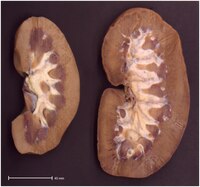Compensatory growth (organ)

Compensatory growth is when your body tries to catch up on missed growth by growing really fast. Imagine your body is a plant and you forgot to water it for a week. The plant stops growing because it doesn’t have enough water, but as soon as you give it lots of water again, it starts growing really quickly to catch up on the time it missed.
The same thing happens in your body when an organ doesn’t grow enough because something happened to slow it down. For example, if a baby is born premature and their lungs haven’t fully developed, their lungs will try to grow really fast to catch up on the time they missed. Or if someone has surgery to remove a part of their liver, the liver will try to grow back quickly to compensate for the part that was removed.
Compensatory growth can be really helpful because it helps your body keep up with the growing it needs to do. But sometimes it can also cause problems if the organ grows too quickly and becomes too big. That’s why doctors keep a close eye on any organs that have experienced compensatory growth to make sure they’re growing properly and not causing any issues.
The same thing happens in your body when an organ doesn’t grow enough because something happened to slow it down. For example, if a baby is born premature and their lungs haven’t fully developed, their lungs will try to grow really fast to catch up on the time they missed. Or if someone has surgery to remove a part of their liver, the liver will try to grow back quickly to compensate for the part that was removed.
Compensatory growth can be really helpful because it helps your body keep up with the growing it needs to do. But sometimes it can also cause problems if the organ grows too quickly and becomes too big. That’s why doctors keep a close eye on any organs that have experienced compensatory growth to make sure they’re growing properly and not causing any issues.
Related topics others have asked about:
